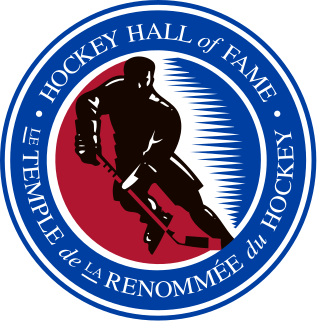
The Hockey Hall of Fame is a museum and hall of fame located in Toronto, Ontario, Canada. Dedicated to the history of ice hockey, it holds exhibits about players, teams, National Hockey League (NHL) records, memorabilia and NHL trophies, including the Stanley Cup. Founded in Kingston, Ontario, the Hockey Hall of Fame was established in 1943 under the leadership of James T. Sutherland. The first class of honoured members was inducted in 1945, before the Hall of Fame had a permanent location. It moved to Toronto in 1958 after the NHL withdrew its support for the International Hockey Hall of Fame in Kingston, Ontario, due to funding issues. Its first permanent building opened at Exhibition Place in 1961. The hall was relocated in 1993, and is now in Downtown Toronto, inside Brookfield Place, and a historic Bank of Montreal building. The Hockey Hall of Fame has hosted International Ice Hockey Federation (IIHF) exhibits and the IIHF Hall of Fame since 1998.

The Ontario Hockey League is one of the three major junior ice hockey leagues which constitute the Canadian Hockey League. The league is for players aged 16–20. There are currently 20 teams in the OHL: seventeen in Ontario, two in Michigan, and one in Pennsylvania.

The Ontario Hockey Association (OHA) is the governing body for the majority of junior and senior level ice hockey teams in the province of Ontario. Founded in 1890, the OHA is sanctioned by the Ontario Hockey Federation along with the Northern Ontario Hockey Association. Other Ontario sanctioning bodies along with the OHF include the Hockey Eastern Ontario and Hockey Northwestern Ontario. The OHA controls three tiers of junior hockey; the "Tier 2 Junior "A", Junior "B", Junior "C", and one senior hockey league, Allan Cup Hockey.

The Original Hockey Hall of Fame, formerly the International Hockey Hall of Fame (IHHOF) is a museum dedicated to the history of ice hockey in Canada, located in Kingston, Ontario, Canada. The IHHOF was intended to be the original Hall of Fame for hockey, but events led to the establishment of the Hockey Hall of Fame in Toronto, Ontario instead. A dedicated building was opened in 1965, and eventually also hosted exhibits for the International Ice Hockey Federation (IIHF) from 1992 to 1997, prior to the establishment of the IIHF Hall of Fame. The IHHOF was renamed the Original Hockey Hall of Fame in 2013, and now focuses on the history of the sport, and emphasis on the role people from Kingston had in its development.
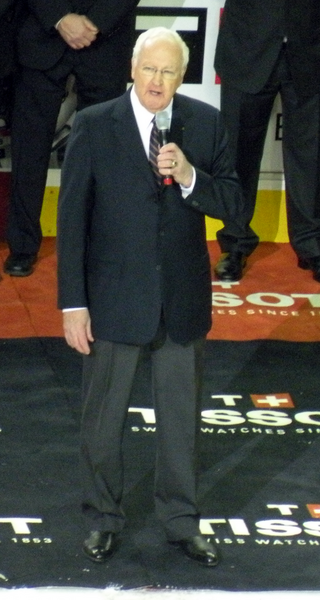
James Murray Costello was a Canadian ice hockey player, executive, and administrator. He played four seasons in the National Hockey League and was the younger brother of Les Costello. He was a lawyer by trade and president of the Canadian Amateur Hockey Association (CAHA) from 1979 to 1994. After facilitating the CAHA merger with Hockey Canada, he continued as president until 1998.
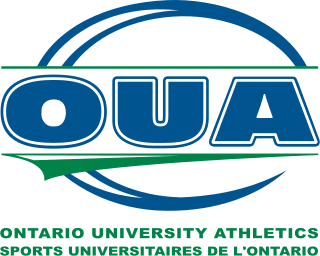
Ontario University Athletics is a regional membership association for Canadian universities which assists in co-ordinating competition between their university level athletic programs and providing contact information, schedules, results, and releases about those programs and events to the public and the media. This is similar to what would be called a college athletic conference in the United States. OUA, which covers Ontario, is one of four such bodies that are members of the country's governing body for university athletics, U Sports. The other three regional associations coordinating university-level sports in Canada are Atlantic University Sport (AUS), the Canada West Universities Athletic Association (CW), and Réseau du sport étudiant du Québec (RSEQ).
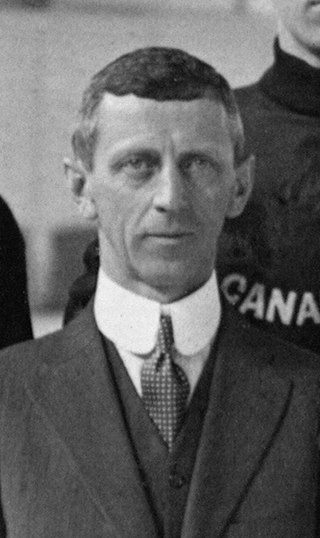
William Abraham Hewitt was a Canadian sports executive and journalist, also widely known as Billy Hewitt. He was secretary of the Ontario Hockey Association (OHA) from 1903 to 1966, and sports editor of the Toronto Daily Star from 1900 to 1931. He promoted the establishment of the Canadian Amateur Hockey Association (CAHA), then served as its secretary-treasurer from 1915 to 1919, registrar from 1921 to 1925, registrar-treasurer from 1925 to 1961, and a trustee of the Allan Cup and Memorial Cup. Hewitt standardized player registrations in Canada, was a committee member to discuss professional-amateur agreements with the National Hockey League, and negotiated working agreements with amateur hockey governing bodies in the United States. He oversaw referees within the OHA, and negotiated common rules of play for amateur and professional leagues as chairman of the CAHA rules committee. After retiring from journalism, he was the managing-director of Maple Leaf Gardens from 1931 to 1948, and chairman of the committee to select the inaugural members of the Hockey Hall of Fame in 1945.
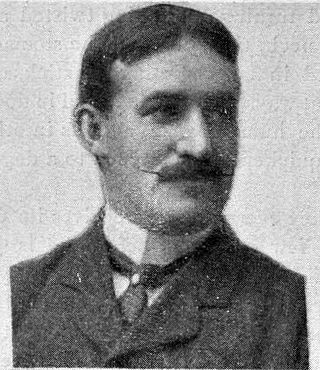
James Thomas Sutherland was a Canadian ice hockey administrator, and founding father of the game in Canada. Sutherland was a pioneer of hockey's early years, helping to develop amateur hockey, and spread the game's popularity throughout the country, and into the United States. He played in the inaugural season of the Ontario Hockey Association, and later coached and refereed the game. He founded the original Kingston Frontenacs, and later became president of the Ontario Hockey Association, and then the Canadian Amateur Hockey Association. He was instrumental in founding the Memorial Cup in 1919, and was at the forefront of the discussion on the origins of hockey.
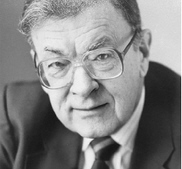
John Walter "Bill" Fitsell was a Canadian journalist, writer and historian. He was a columnist for The Kingston Whig-Standard from 1961 to 1993, and was the founding president of the Society for International Hockey Research in 1991. He was involved with the International Hockey Hall of Fame from 1969 to 2005, serving as its curator and historian. He published five books during his career including four on the history of ice hockey, and helped organize the Historic Hockey Series to commemorate early ice hockey games played in Kingston, Ontario. He was inducted into both the Kingston and District Sports Hall of Fame and the Lindsay District Sports Hall of Fame, and received the 125th Anniversary of the Confederation of Canada Medal.
The Royal Canadian Rifle Regiment of the British Army was raised in 1840 for service in Canada. Its members were veterans of service in other regiments of the British Army.
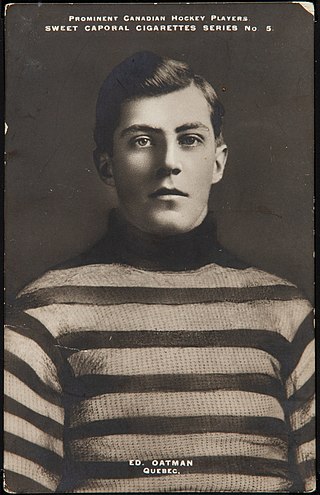
Edward Cole Oatman was a Canadian professional ice hockey player. He was among the elite goal scorers of his era. Among his 32 years (1907–39) playing professional ice hockey, Oatman was named an all-star for ten consecutive seasons by the Pacific Coast Hockey Association (PCHA). He was a star with the Quebec Bulldogs when it won the 1912 Stanley Cup. Oatman played with clubs that won five league championships, and he was a successful coach and captain of five different hockey teams. His brother Russell also played professional ice hockey.

John Maxwell Roxburgh was a Canadian ice hockey administrator and politician. He organized minor ice hockey in his hometown of Simcoe, Ontario, co-founded the Ontario Juvenile Hockey Association in 1934, and the Ontario Minor Hockey Association in 1940. He served as president of the Ontario Hockey Association from 1950 to 1952, improved its finances to become profitable, and appointed Bill Hanley as a full-time manager to operate the association as a business. Roxburgh served as president of the Canadian Amateur Hockey Association from 1960 to 1962, arranged exhibition games between Canada and the Soviet Union amid an increased rivalry between the respective national teams, and pushed for the separation of politics and sport when the Cold War threatened to cancel the 1962 Ice Hockey World Championships. He was opposed to changes in the Olympic Oath and the international definition of amateurism, and later recommended the formation of a student-athlete team coached by Father David Bauer to become the Canada men's national ice hockey team.
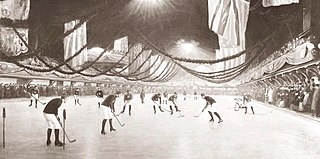
On March 3, 1875, the first recorded indoor ice hockey game took place at the Victoria Skating Rink in Montreal, Quebec. Organized by James Creighton, who captained one of the teams, the game was between two nine-member teams, using a rubber "puck". Members used skates and sticks used for outdoor hockey and shinny games in Nova Scotia, where Creighton was born and raised. It is recognized as the first organized ice hockey game.
The Canadian Society of Forensic Science (CSFS) is a professional association aimed at maintaining professional standards and promoting and enhancing the study and stature of forensic science. Membership in the society is open internationally to professionals with an active interest in the forensic sciences.
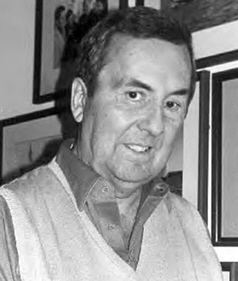
Gordon Ralph Renwick was a Canadian ice hockey administrator, who served as president of the Canadian Amateur Hockey Association (CAHA), vice-president of the International Ice Hockey Federation (IIHF), and was the team president of the Galt Hornets.

Samuel Hunter Bennett is a Canadian professional ice hockey forward for the Florida Panthers of the National Hockey League (NHL). Bennett was rated by the NHL Central Scouting Bureau as the top North American prospect for the 2014 NHL Entry Draft, where he was selected fourth overall by the Calgary Flames. Bennett made his NHL debut in the 2014–15 season. Bennett won the Stanley Cup with the Panthers in 2024.

William Edward "Billy, Pud" Hamilton was a Canadian professional ice hockey defenceman who was active in the early 1900s. Hamilton played for the Pittsburgh Athletic Club in the Western Pennsylvania Hockey League, as well as for the Michigan Soo Indians in the International Professional Hockey League. He also appeared in two games with the Pittsburgh Bankers.

Frank Ernest Sandercock was a Canadian ice hockey administrator. He served as president of both the Canadian Amateur Hockey Association and the Alberta Amateur Hockey Association, and had previously been an executive with the Ontario Hockey Association and founded a hockey organization to operate leagues in Calgary. He was an early proponent of junior ice hockey and senior ice hockey in Alberta, fostered growth in the game, and sought to reinvest profits into minor ice hockey for the younger generation.
Rhonda Leeman Taylor is a former women's ice hockey player and ice hockey administrator from Canada. In 1980, Leeman Taylor became the first salaried female employee of the Ontario Women's Hockey Association (OWHA). Leeman Taylor also served as the chairwoman for the inaugural Women's National Hockey Championships in 1982 and became the first woman to sit on the board of the Canadian Amateur Hockey Association. Taylor also sat on the board of the Ontario Women's Hockey Association (OWHA). A book about her career and co-written with her niece, Denbeigh Whitmarsh was released in 2019. Leeman Taylor is also a Kingston and District Sports Hall of Fame member.
Brent Ladds is a Canadian former ice hockey administrator. He served as president of the Canadian Junior Hockey League (CJHL) from 2016 to 2022, president of the Ontario Hockey Association (OHA) from 1980 to 2012, commissioner of Allan Cup Hockey from 2013 to 2016, and chairman of the Hockey Canada junior hockey council from 2014 to 2016. He marketed the CJHL as a development program for players seeking a professional career or an education, with exposure to National Hockey League talent scouts at the annual CJHL Prospects Game and World Junior A Challenge. He also sought to increase marketing opportunities, have consistent administrative practices, and to co-ordinate public relations across the CJHL. His tenure as president also saw the withdrawal of the British Columbia Hockey League, and subsequent format change of the Centennial Cup tournament to include all nine league champions.
















